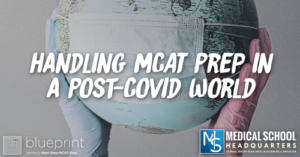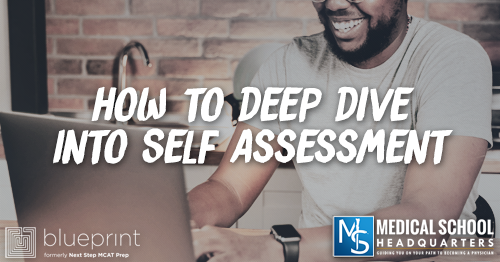Apple Podcasts | Google Podcasts
Session 318
You struggled with your online classes, and now you’ve got to take the MCAT based on what you learned. Here are some tips on how to get through.
We’re joined by George from Blueprint MCAT. If you would like to follow along on YouTube, go to premed.tv.
Listen to this podcast episode with the player above, or keep reading for the highlights and takeaway points.
[02:26] Transitioning from the COVID Era to MCAT
George’s thoughts on COVID-era students reflect the challenges and difficulties that many students have faced during this time. He empathizes with them, having experienced the tail end of the COVID era himself.
The shift to online learning and the lack of in-person interactions have had a significant impact on student’s mental and academic well-being.
George acknowledges the burnout, zoom fatigue, and the feeling of isolation that students have experienced. Learning online for extended hours can be draining and less enjoyable compared to traditional classroom settings. He also highlights the irony of institutions previously emphasizing the importance of in-person education, only to transition to online learning due to the pandemic.
Furthermore, George understands the additional challenges that students face when it comes to specialized classes and important exams like the MCAT. The absence of live instructors and the reliance on videos can make it harder for students to grasp complex concepts and receive adequate support. Additionally, he recognizes that standardized assessments may not fully capture a student’s understanding or appreciation of a topic.
George acknowledges the difficulties that COVID-era students have encountered and emphasizes the importance of providing support and understanding during this challenging time.
[05:09] Navigating MCAT Prep: Finding the Right Path
Success Beyond Traditional Foundations
In the world of MCAT preparation, success is not limited to those with traditional academic backgrounds. Students from various disciplines and pathways have found ways to excel in their journey towards medicine.
Even without a strong foundation in undergraduate coursework, it is encouraging to learn from exemplary students who have overcome similar challenges and achieved their goals. There is a method to the madness, and it is possible to make it work.
Choosing the Right Prep Materials
Selecting the appropriate prep materials for the MCAT can be overwhelming, regardless of your academic background. Factors such as learning style and the depth of your existing knowledge play crucial roles. If you feel that your foundation is lacking, it is essential to consider your options.
'If you're prepping for the MCAT, you should go with some kind of prep resource because there's so much on the MCAT. It's overwhelming to figure out what is testable and what isn't.'Click To TweetWhile there are free resources available online, it is recommended to invest in a comprehensive prep resource. The MCAT covers a vast range of topics but in a shallow manner. Thus, having structured prep materials can ensure that you cover all the necessary content.
Tailoring Your Approach to Your Learning Style
Understanding your own learning style is pivotal in determining the most effective path for MCAT prep. If you prefer independent study, value efficiency, and are a quick reader, utilizing textbooks and practice exams could prove beneficial.
On the other hand, if you thrive in a community-oriented environment, crave interaction, and prefer live instruction, a prep course or online live course might be the better option. Having access to instructors, office hours, and the ability to ask questions can provide the additional support needed to succeed.
While the MCAT can be challenging, it is important to remember that success is attainable even without a traditional academic foundation. By carefully selecting the right prep materials and tailoring your approach to your learning style, you can navigate the MCAT journey with confidence and maximize your chances of achieving your goals.
[08:23] Choosing the Best MCAT Strategy for You
The Importance of Individualized Approaches
According to George, there is no universal strategy for MCAT preparation that works for every student. Each student has a unique learning style and mindset, which should be considered when devising an effective study plan.
'Our learning styles are different, the way we approach things can be different. And fundamentally, it comes down the lot to a mindset.'Click To TweetIt is crucial to recognize that learning is not a linear process, and progress may not always be evident every day. Understanding this can help students approach their preparation with a more open mind and realistic expectations.
Active vs. Passive Learning
George emphasizes the significance of active learning over passive learning. Merely watching videos or reading materials without actively engaging with the content may lead to limited retention.
He encourages students to actively participate in their learning by verbalizing concepts, recalling information, and applying knowledge through practice questions. This approach helps ensure that the information sticks and can be recalled when needed.
Embracing Mistakes and Seeking Support
Making mistakes is an essential part of the learning process, according to George. Students should not only accept but also embrace their mistakes.
By identifying areas of weakness or gaps in understanding, they can take targeted actions to address them. This may involve revisiting specific study materials, seeking clarification through office hours or online forums, or engaging with tutors or study groups for additional support.
Recognizing individual needs and taking advantage of available resources can greatly enhance the learning experience.
Finding What Works for You
George acknowledges that not every study method or resource will work for every student. It is essential for students to assess their own needs and preferences to determine the most effective approach. This may involve experimenting with different techniques, breaking up study blocks, incorporating active learning strategies, or utilizing small pockets of time for focused review.
Recognizing one’s capabilities and being open to adapting the study plan can lead to better outcomes.
In conclusion, George emphasizes the importance of tailoring MCAT preparation strategies to individual learning styles and mindsets. Active learning, embracing mistakes, seeking support, and finding what works best for oneself are key components of a successful MCAT journey. By adopting these approaches and maintaining a positive mindset, students can navigate the process with confidence and achieve their desired results.
[12:15] Rediscovering the Passion for Learning in Challenging Times
Losing the Spark of Passion
George acknowledges that the COVID-19 pandemic has presented unique challenges for medical school students. Many premed students, including himself, have experienced a loss of passion for learning due to factors like Zoom fatigue and repetitive lectures. This can be frustrating as the core love for science and the excitement of discovering new concepts start to fade away.
Making Learning Fun Again
To combat this loss of passion, George encourages students to find ways to make learning enjoyable once more. He suggests gamifying the learning process. Whether’s that’s incorporating quizzes, creating a scoring system, or rewarding oneself after completing a certain number of practice questions.
By adding an element of fun and excitement, students can reignite their interest in science and regain that sense of wonder.
'Find ways to make learning fun again, because learning is fun. Science is cool. And when you find that passion, it takes away from just ‘Oh, I'm studying this because I need to take an exam.'Click To TweetOvercoming Loneliness and Fatigue
Studying for exams, especially during remote learning, can be isolating and exhausting. George recommends finding ways to connect with others and make studying a social activity. Whether it’s studying with friends or implementing a token economy system where accomplishments are rewarded with social activities, it’s important to combat loneliness and maintain motivation.
Embracing the Coolness of Science
George reminds students that at its core, science is fascinating and cool. By visualizing processes, such as gene pathways or protein interactions, students can tap into their imagination and create a mental movie that brings concepts to life.
Finding joy in understanding how things work and appreciating the beauty of scientific principles can reignite the passion for learning.
Finally, George urges students to stay resilient and keep their heads high, even when facing challenges that dampen their enthusiasm for learning. By finding innovative ways to make learning fun, connecting with peers, and embracing the inherent coolness of science, students can rediscover their passion and continue on their journey toward medical school. The hard work and dedication will ultimately be worth it in the end.
[17:14] Finding Hope and Taking the Next Step
George emphasizes the importance of finding hope in challenging times. We do acknowledge the frustrations and setbacks caused by COVID-19 and the current state of society. But you should not dwell on past grievances. Rather, focus on what you can do next.
George reminds us that we are more capable than we think. It’s natural to feel overwhelmed and uncertain about the future, but by identifying our next step and taking action, we can move in the right direction. He reassures students that they don’t need to have their entire future planned out step by step. As long as they have a clear vision of their immediate next step, they will continue progressing towards their goals.
Through this message, George instills a sense of optimism and determination. He encourages students to believe in their abilities and remain resilient, knowing that by taking each successive step, they will eventually reach their desired destination.
By focusing on the next step and believing in their own capabilities, students can navigate the challenges ahead and forge their own path to success.
Links:
SEARCH SITE
SEARCH SITE
LISTEN FOR FREE












